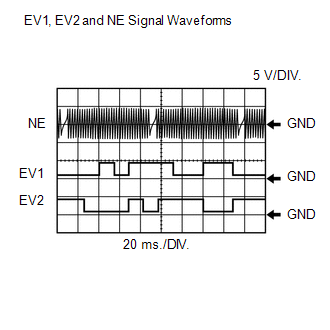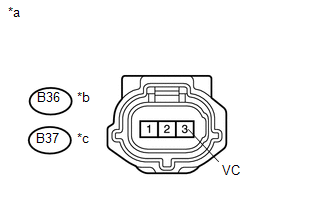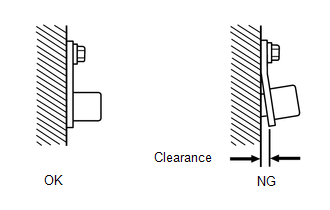- Open or short in VVT sensor (for exhaust side of bank 1, 2) circuit
- VVT sensor (for exhaust side of bank 1, 2)
- Exhaust camshaft
- ECM
| Last Modified: 08-28-2024 | 6.11:8.1.0 | Doc ID: RM100000000VIBS |
| Model Year Start: 2016 | Model: Sienna | Prod Date Range: [12/2015 - 08/2016] |
| Title: 2GR-FE (ENGINE CONTROL): SFI SYSTEM: P0365,P0367,P0368,P0390,P0392,P0393; Camshaft Position Sensor "B" Circuit (Bank 1); 2016 MY Sienna [12/2015 - 08/2016] | ||
|
DTC |
P0365 |
Camshaft Position Sensor "B" Circuit (Bank 1) |
|
DTC |
P0367 |
Camshaft Position Sensor "B" Circuit Low Input (Bank 1) |
|
DTC |
P0368 |
Camshaft Position Sensor "B" Circuit High Input (Bank 1) |
|
DTC |
P0390 |
Camshaft Position Sensor "B" Circuit (Bank 2) |
|
DTC |
P0392 |
Camshaft Position Sensor "B" Circuit Low Input (Bank 2) |
|
DTC |
P0393 |
Camshaft Position Sensor "B" Circuit High Input (Bank 2) |
DESCRIPTION
The VVT sensor (for exhaust side) consists of a magnet and MRE (Magneto Resistive Element).
The exhaust camshaft has a sensor plate with 3 teeth on its outer circumference.
When the exhaust camshaft rotates, changes occur in the air gaps between the 3 teeth and MRE, which affects the magnet. As a result, the resistance of the MRE material fluctuates. The VVT sensor (for exhaust side) converts the exhaust camshaft rotation data to pulse signals, uses the pulse signals to determine the camshaft angle, and sends it to the ECM.
The crankshaft (crank angle sensor plate) has 34 teeth. The pickup coil generates 34 signals for each engine rotation. Based on combination of the VVT signals and NE signal, the ECM detects the crankshaft angle. Then the ECM uses this data to control fuel injection time and injection timing. Also, based on the NE signal, the ECM detects the engine speed.
|
DTC No. |
DTC Detection Condition |
Trouble Area |
|---|---|---|
|
P0365 P0390 |
Missing exhaust VVT sensor (for exhaust side) signal for 5 seconds at engine speed of 600 rpm or more (1 trip detection logic) |
|
|
P0367 P0392 |
Output voltage of VVT sensor (for exhaust side of bank 1, 2) less than 0.3 V for 4 seconds (1 trip detection logic) |
|
|
P0368 P0393 |
Output voltage of VVT sensor (for exhaust side of bank 1, 2) more than 4.7 V for 4 seconds (1 trip detection logic) |
|

Reference: Inspection using an oscilloscope
HINT:
- The correct waveform is as shown in the illustration.
- The wavelength becomes shorter as the engine speed increases.
- EV1+ and EV2+ stand for the VVT sensor (for exhaust side) signal, and NE+ stands for the crankshaft position sensor signal.
|
Item |
Content |
|---|---|
|
ECM Terminal Names |
Between EV1+ and VV1-, or EV2+ and VV1- Between NE+ and NE- |
|
Tester Range |
5 V/DIV., 20 ms./DIV. |
|
Condition |
Idling with warm engine |
MONITOR DESCRIPTION
If no signal is transmitted by the VVT sensor (for exhaust side) despite the engine revolving, the ECM interprets this as a malfunction of the sensor.
When the sensor output voltage remains less than 0.3 V, or more than 4.7 V for more than 5 seconds, the ECM stores a DTC.
MONITOR STRATEGY
|
Related DTCs |
P0365: VVT sensor (for exhaust side of bank 1) verify pulse input P0367: VVT sensor (for exhaust side of bank 1) range check (low voltage) P0368: VVT sensor (for exhaust side of bank 1) range check (high voltage) P0390: VVT sensor (for exhaust side of bank 2) verify pulse input P0392: VVT sensor (for exhaust side of bank 2) range check (low voltage) P0393: VVT sensor (for exhaust side of bank 2) range check (high voltage) |
|
Required sensors/Components (Main) |
VVT sensor (for exhaust side of bank 1, 2) |
|
Required sensors/Components (Related) |
Crankshaft position sensor |
|
Frequency of operation |
Continuous |
|
Duration |
4 seconds: P0367 and P0392 (VVT sensor (for exhaust side of bank 1, 2) range check [low voltage]) P0368 and P0393 (VVT sensor (for exhaust side of bank 1, 2) range check [high voltage]) 5 seconds: P0365 and P0390 (VVT sensor (for exhaust side of bank 1, 2) verify pulse input) |
|
MIL operation |
Immediately |
|
Sequence of operation |
None |
TYPICAL ENABLING CONDITIONS
All
|
Monitor runs whenever following DTCs are not present |
None |
P0365 and P0390: VVT Sensor (for exhaust side of bank 1, 2) Verify Pulse Input
|
Engine speed |
600 rpm or more |
|
Starter |
OFF |
|
Exhaust VVT sensor range check fail (P0367, P0368, P0392, P0393) |
Not detected |
|
Exhaust VVT sensor voltage |
0.3 V or higher, and 4.7 V or less |
|
Battery voltage |
8 V or higher |
|
Ignition switch |
ON |
P0367, P0368, P0392, P0393: VVT Sensor (for exhaust side of bank 1, 2) Range Check (Low Voltage, High Voltage)
|
Starter |
OFF |
|
Ignition switch |
ON |
|
Time after ignition switch off to ON |
2 seconds or more |
|
Exhaust VVT sensor pulse input fail (P0365, P0390) |
Not detected |
|
Battery voltage |
8 V or higher |
TYPICAL MALFUNCTION THRESHOLDS
P0365 and P0390: VVT Sensor (for exhaust side of bank 1, 2) Verify Pulse Input
|
Exhaust VVT sensor signal |
No signal |
P0367 and P0392: VVT Sensor (for exhaust side of bank 1, 2) Range Check (Low Voltage)
|
Exhaust VVT sensor voltage |
Less than 0.3 V |
P0368 and P0393: VVT Sensor (for exhaust side of bank 1, 2) Range Check (High Voltage)
|
Exhaust VVT sensor voltage |
Higher than 4.7 V |
COMPONENT OPERATING RANGE
|
VVT sensor for exhaust side voltage |
0.3 V or higher, and 4.7 V or less |
CONFIRMATION DRIVING PATTERN
- Connect the Techstream to the DLC3.
- Turn the ignition switch to ON and turn the Techstream on.
-
Clear DTCs (even if no DTCs are stored, perform the clear DTC procedure) (See page
![2016 MY Sienna [12/2015 - 08/2016]; 2GR-FE (ENGINE CONTROL): SFI SYSTEM: DTC CHECK / CLEAR](/t3Portal/stylegraphics/info.gif) ).
).
- Turn the ignition switch off and wait for at least 30 seconds.
- Turn the ignition switch to ON and turn the Techstream on.
- Start the engine.
- Idle the engine for 10 seconds [A].
- Enter the following menus: Powertrain / Engine / Utility / All Readiness.
- Input the DTC: P0365, P0367, P0368, P0390, P0392 or P0393.
-
Check the DTC judgment result [B].
Techstream Display
Description
NORMAL
- DTC judgment completed
- System normal
ABNORMAL
- DTC judgment completed
- System abnormal
INCOMPLETE
- DTC judgment not completed
- Perform driving pattern after confirming DTC enabling conditions
N/A
- Unable to perform DTC judgment
- Number of DTCs which do not fulfill DTC preconditions has reached ECU's memory limit
HINT:
- If the judgment result shows ABNORMAL, the system has a malfunction.
- If the judgment result shows INCOMPLETE or N/A, perform steps [A] and [B] again.
- If the test result is N/A, enter the following menus: Powertrain / Engine / Trouble Codes.
-
Read Pending DTCs.
HINT:
If a pending DTC is output, the system is malfunctioning.
-
If the test result is INCOMPLETE or N/A and no pending DTC is output, perform a universal trip and check for permanent DTCs (See page
![2016 MY Sienna [12/2015 - 08/2016]; 2GR-FE (ENGINE CONTROL): SFI SYSTEM: DTC CHECK / CLEAR](/t3Portal/stylegraphics/info.gif) ).
).
HINT:
- If a permanent DTC is output, the system is malfunctioning.
- If no permanent DTC is output, the system is normal.
WIRING DIAGRAM
Refer to DTC P0335 (See page
![2016 MY Sienna [12/2015 - 08/2016]; 2GR-FE (ENGINE CONTROL): SFI SYSTEM: P0335,P0339; Crankshaft Position Sensor "A" Circuit+](/t3Portal/stylegraphics/info.gif) ).
).
CAUTION / NOTICE / HINT
HINT:
- Read freeze frame data using the Techstream. The ECM records vehicle and driving condition information as freeze frame data the moment a DTC is stored. When troubleshooting, freeze frame data can help determine if the vehicle was moving or stationary, if the engine was warmed up or not, if the air fuel ratio was lean or rich, and other data from the time the malfunction occurred.
- If no problem is found by this diagnostic troubleshooting procedure, troubleshoot the engine mechanical system.
-
Bank 1 refers to the bank that includes the No. 1 cylinder*.
*: The No. 1 cylinder is the cylinder which is farthest from the transaxle.
- Bank 2 refers to the bank that does not include the No. 1 cylinder.
PROCEDURE
|
1. |
CHECK VVT SENSOR (FOR EXHAUST SIDE) (SENSOR POWER SOURCE) |
|
(a) Disconnect the VVT sensor (for exhaust side) connectors. |
|
(b) Turn the ignition switch to ON.
(c) Measure the voltage according to the value(s) in the table below.
Standard Voltage:
|
Tester Connection |
Switch Condition |
Specified Condition |
|---|---|---|
|
B36-3 (VC2) - Body ground |
Ignition switch ON |
4.5 to 5.5 V |
|
B37-3 (VC2) - Body ground |
Ignition switch ON |
4.5 to 5.5 V |
Text in Illustration
|
*a |
Front view of wire harness connector (to VVT Sensor (for Exhaust Side) |
|
*b |
Bank 1 |
|
*c |
Bank 2 |
| NG |

|
|
|
2. |
CHECK HARNESS AND CONNECTOR (VVT SENSOR (FOR EXHAUST SIDE) - ECM) |
(a) Disconnect the B36 and B37 VVT sensor (for exhaust side) connectors.
(b) Disconnect the B1 ECM connector.
(c) Measure the resistance according to the value(s) in the table below.
Standard Resistance:
|
Tester Connection |
Condition |
Specified Condition |
|---|---|---|
|
B36-1 (EX+) - B1-69 (EV1+) |
Always |
Below 1 Ω |
|
B36-2 (EX-) - B1-89 (VV1-) |
Always |
Below 1 Ω |
|
B37-1 (EX+) - B1-64 (EV2+) |
Always |
Below 1 Ω |
|
B37-2 (EX-) - B1-89 (VV1-) |
Always |
Below 1 Ω |
|
B36-1 (EX+) or B1-69 (EV1+) - Body ground |
Always |
10 kΩ or higher |
|
B36-2 (EX-) or B1-89 (VV1-) - Body ground |
Always |
10 kΩ or higher |
|
B37-1 (EX+) or B1-64 (EV2+) - Body ground |
Always |
10 kΩ or higher |
|
B37-2 (EX-) or B1-89 (VV1-) - Body ground |
Always |
10 kΩ or higher |
| NG |

|
REPAIR OR REPLACE HARNESS OR CONNECTOR |
|
|
3. |
CHECK SENSOR INSTALLATION (VVT SENSOR (FOR EXHAUST SIDE)) |
|
(a) Check the VVT sensor (for exhaust side) installation. OK: Sensor is installed correctly. |
|
| NG |

|
|
|
4. |
CHECK EXHAUST CAMSHAFT |
(a) Check the teeth of the sensor plate.
OK:
Sensor plate teeth do not have any cracks or deformation.
HINT:
Perform "Inspection After Repair" after replacing the exhaust camshaft (See page
![2016 MY Sienna [12/2015 - 08/2016]; 2GR-FE (ENGINE CONTROL): SFI SYSTEM: INITIALIZATION](/t3Portal/stylegraphics/info.gif) ).
).
| NG |

|
|
|
5. |
REPLACE VVT SENSOR (FOR EXHAUST SIDE) |
(a) Replace the VVT sensor (for exhaust side) (See page
![2016 MY Sienna [12/2015 - 08/2016]; 2GR-FE (ENGINE CONTROL): CAMSHAFT POSITION SENSOR: REMOVAL](/t3Portal/stylegraphics/info.gif) ).
).
|
|
6. |
CHECK WHETHER DTC OUTPUT RECURS (DTC P0365, P0367, P0368, P0390, P0392 AND/OR P0393) |
(a) Connect the Techstream to the DLC3.
(b) Turn the ignition switch to ON.
(c) Turn the Techstream on.
(e) Turn the ignition switch off and wait for at least 30 seconds.
(f) Turn the ignition switch to ON and turn the Techstream on.
(g) Start the engine and warm it up.
(h) Drive the vehicle in accordance with the driving pattern described in the Confirmation Driving Pattern.
(i) Enter the following menus: Powertrain / Engine / Utility / All Readiness.
(j) Input the DTC: P0365, P0367, P0368, P0390, P0392, or P0393.
(k) Check the DTC judgment result.
Result
|
Result |
Proceed to |
|---|---|
|
NORMAL (DTC is not output) |
A |
|
ABNORMAL (DTC P0365, P0367, P0368, P0390, P0392 or P0393 is output) |
B |
HINT:
If the engine does not start, replace the ECM.
| A |

|
END |
| B |

|
|
7. |
CHECK HARNESS AND CONNECTOR (VVT SENSOR (FOR EXHAUST SIDE) - ECM) |
(a) Disconnect the B36 and B37 VVT sensor (for exhaust side) connectors.
(b) Disconnect the B1 ECM connector.
(c) Measure the resistance according to the value(s) in the table below.
Standard Resistance:
|
Tester Connection |
Condition |
Specified Condition |
|---|---|---|
|
B36-3 (VC2) - B1-67 (VCV1) |
Always |
Below 1 Ω |
|
B37-3 (VC2) - B1-67 (VCV1) |
Always |
Below 1 Ω |
|
B36-3 (VC2) or B1-67 (VCV1) - Body ground |
Always |
10 kΩ or higher |
|
B37-3 (VC2) or B1-67 (VCV1) - Body ground |
Always |
10 kΩ or higher |
| OK |

|
| NG |

|
REPAIR OR REPLACE HARNESS OR CONNECTOR |
|
|
|


